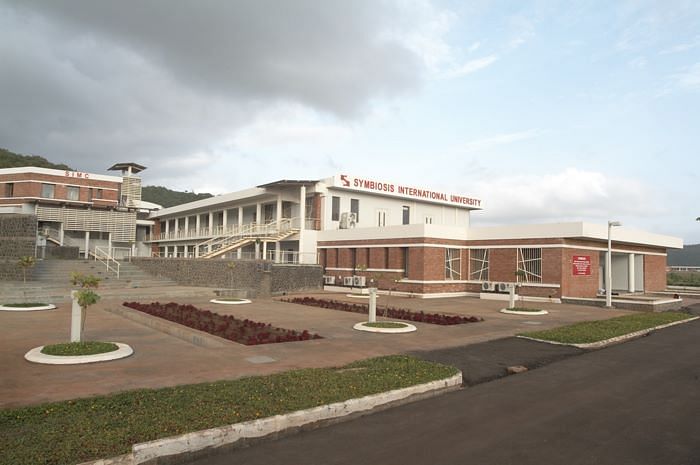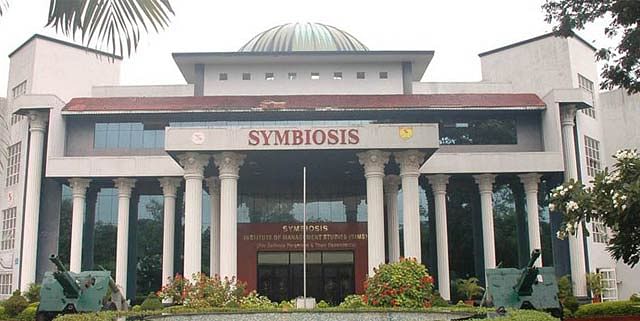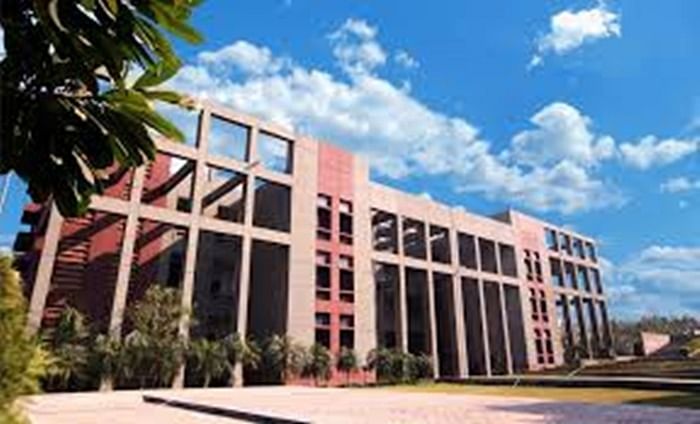MBA in Data Analytics: Course Details, Eligibility, Fees, Admission, Duration

MBA in Data Analytics is a two-year post-graduation course based on the fundamental knowledge of big data, data mining, database management, data science, and data warehousing. The MBA Data Analytics course curriculum introduces students to data handling, data warehousing & visualization along with the latest analytical software in business process management.
MBA in Data Analytics eligibility requires student to have a minimum of 45-50% marks in undergraduate degree along with qualifying entrance exams such as CAT, MAT, XAT, CMAT, etc. The MBA Data Analytics course fee ranges between INR 60,000-7 LPA.
Table of Contents
- About MBA in Data Analytics Course
- MBA in Data Analytics Eligibility Criteria
- Why Choose an MBA in Data Analytics Course?
- MBA in Data Analytics Admission Process
- MBA in Data Analytics Entrance Exams
- Top MBA Data Analytics Colleges in India with Fees Details
- MBA Data Analytics Cutoff of Top Colleges
- Types of MBA in Data Analytics Courses
- MBA Data Analytics Syllabus and Subjects
- MBA in Data Analytics vs MBA in Business Analytics
- Salary of MBA in Data Analytics
- Courses After MBA in Data Analytics
- Career Options after MBA in Data Analytics
- Skills Required for MBA in Data Analytics Graduate
MBA in Data Analytics Course Details
| Degree | Masters |
| Full Form | Master of Business Administration in Data Analytics |
| Duration | 2 Years |
| Age | No age specification |
| Minimum Percentage | 45-50% % academic aggregate in Bachelor’s degree for General Candidates, Reserved Candidates can get 5% relaxation. |
| Average Fees | ₹3 - 27 LPA |
| Average Salary | INR 5 LPA - INR 25 LPA [Source: PayScale] |
| Employment Roles | Data Analyst, Business Analyst, Data Architect, Data Developer, Data Scientist, Data Deployment Strategist. |
| Top Recruiters | Fractal Analytics, Mu Sigma, Accenture, Convergytics, Capgemini, Genpact |
About MBA in Data Analytics Course
MBA in Data Analytics is a two-year postgraduate program that focuses on the areas of data science and includes the study of collecting information, identifying the data from the information, organizing the data, and determining the data pattern. This course is under the umbrella of the MBA courses and aims to deliver knowledge based on various applications of data analytics in the business process.
MBA in Data Analytics course comprises data statistics, data patterns, quantitative analysis, client relationships management, and database management along with preparing graduates as per best industry standards. Hence, the scope of MBA in Data Analytics is vast in various sectors such as finance, education, airports, transport, hospitality, government, healthcare, etc., with an average salary between INR 5-25 LPA, as per the experience level.
Also, Check: How to Become a Data Scientist
MBA in Data Analytics Eligibility Criteria
The MBA in Data Analytics eligibility criteria is subject to change depending on college rules. However, most colleges have particular requirements that all applicants must meet. The following criteria must be met to qualify for the MBA in Data Analytics:
- Candidates are required to have a bachelor's degree such as BBA/BCom/BTech, etc., with a minimum of 45%–50% academic aggregate from an acknowledged college or university. Candidates under reserved categories can get a 5% relaxation. Along with qualifying for national entrance exams like MAT, XAT, CAT, etc.
- Top institutions require students to have a minimum of 80-90 cut-off in any one of the MBA entrance exams.
- There is no specific age restriction to enroll in the course.
Why Choose an MBA in Data Analytics Course?
MBA in Data Analytics is a specialization course focusing on data analysis, data handling, data cleaning, finding patterns from data, etc. The following are some of the benefits of undertaking this course.
- Industry-Relevant Knowledge: Candidates get to acquire in-depth knowledge of identifying, assembling, interpreting, and efficiently analyzing data.
- Demand: The demand for data analysts is significantly high order as they control the organizations' confidential data and reports as per the requirements within a limited time frame.
- Industry Growth: In today's digital world, firms are entirely dependent on data. According to Analytics India Mag, the analytics market value increased significantly rising by 34.5% yearly.
- Research and Higher Education: Graduates can pursue higher education in data science or visualization based on their skills and knowledge and opt for research work.
- Career Growth: In today's competitive career market, firms cannot run without a data management team. MBA in Data Analytics graduates.
- Skill Development: Candidates get to learn about figuring the data models, analyzing large datasets, reporting packages, etc.
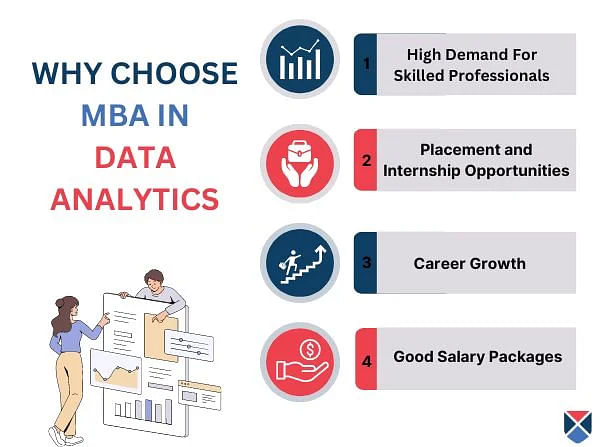
Also, Read: Why MBA? Top Reasons to Pursue an MBA
MBA in Data Analytics Admission Process
Admission to colleges providing MBA in Data Analytics is based on merit and entrance exam score. Some private colleges like Chandigarh University perform their selection process by conducting university-level entrance exams such as CUCET. Following is the step-by-step procedure for MBA in Data Analytics admission.
- Step 1: One can apply online through the college website and submit the required documents. However, students can visit the college admission desk for offline admission.
- Step 2: Candidates will be selected for further process based on their eligibility requirements and qualifying cut-off scores for the entrance exams.
- Step 3: Candidates may have to appear for personal interview sessions and group discussions for final selection.
- Step 4: Shortlisted students must finish the documentation process, pay the admission fees, and wait for class commencement.
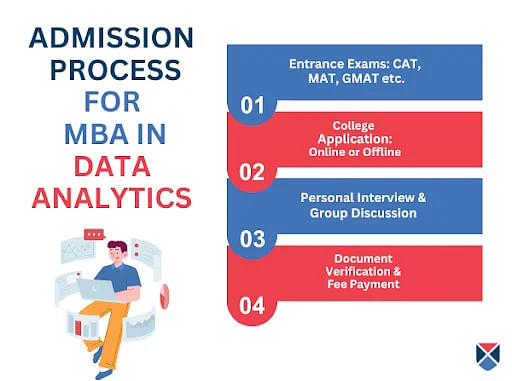
Also, Check: MBA Admission Process
MBA in Data Analytics Entrance Exams
MBA Data Analytics eligibility for top colleges depends on passing with required cut-off marks in the MBA entrance exams such as CAT, SNAP, XAT, etc. These entrance exams are monitored by national or state authorities. A detailed view of the different entrance exams for MBA in Data Analytics is provided below:
|
MBA Data Analytics Entrance Exams |
Examination Date |
Accepting Colleges |
| Nov 26, 2023 |
Pondicherry University, Amity University, IILM |
|
| Feb 25- Dec 17, 2023 |
CU, Amity University, IILM, LNCT |
|
| Jan 7, 2024 |
Amity University, IILM |
|
| Dec 10, 17, 22, 2023 |
SCIT |
|
| Oct 10- Dec 19, 2023 |
Amity University, IILM |
|
| February 2024 (Tentative) |
IILM |
|
| Mar 11 - Mar 28, 2024 |
Pondicherry University |
Top MBA Data Analytics Colleges in India with Fees Details
The top colleges in India offer an MBA in Data Analytics in combination with Business Intelligence and Data Science. The top private colleges inlcude Amity University, SCIT Pune, etc., as well as a few government colleges like Pondicherry University. The average MBA in Data Analytics fees range between INR 60,000-7 LPA. MBA course fees are determined by factors such as academic structure, college amenities, location, and so on.
The following table represents the best colleges for an MBA in Data Analytics in India along with their average course fees:
|
Name of the College |
Average Tuition Fees |
Admission Fees |
Miscellaneous Fees |
|
INR 60,000 PA |
- |
INR 8,000 PA |
|
|
INR 6.9 LPA |
INR 35,000 |
INR 1.70 LPA |
|
|
INR 2.08 LPA |
INR 15,000 |
- |
|
|
INR 3.04 LPA |
INR 90,000 |
- |
|
|
INR 85,000 PA |
- |
INR 52,000 PA |
|
|
INR 2.25 LPA |
- |
INR 1 LPA |
Best MBA in Data Analytics Colleges in India City Wise
Below listed are location-wise MBA Data Analytics colleges in India with the average annual fees:
| Location | Average Fees |
| MBA Data Analytics Colleges in Maharashtra | INR 1.50-5.50 LPA |
| MBA Data Analytics Colleges in Puducherry | INR 60,000-4 LPA |
| MBA Data Analytics Colleges in Uttar Pradesh | INR 75,000-6 LPA |
MBA Data Analytics Cutoff of Top Colleges
Admission to top MBA Data Analytics courses is based on qualifying MBA entrance exams with required cut-off marks. These cut-off marks fluctuate due to changing regulations by college administrators. The following are some of the most well-known college entrance exams and their cutoffs:
CAT Cutoff
The Common Admission Test is one of the most essential entrance exams for admission to top MBA colleges. The CAT entrance exam 2023 will be conducted in the month of November. The following cut-off marks are based on previous predictions according to the previous years’ cut-off marks as the CAT cut-off 2023 is yet to be released.
|
Name of the College |
Expected CAT Cutoff 2023 (Percentile) |
|
Chandigarh University |
88+ |
|
SCIT Pune |
70+ |
|
Prestige University |
65+ |
|
Amity University |
80+ |
|
Pondicherry University |
85+ |
Read More on CAT Cutoff 2023
MAT Cutoff
Management admission test is another important entrance exam for admission to good MBA colleges. The MAT entrance exam is conducted around September. The difficulty level is moderate compared to the CAT. The following is the representation of the expected MAT cutoff 2023 along with an MBA in Data Analytics colleges.
|
Name of the College |
Expected MAT Cutoff 2023 (Percentile) |
|
Amity University |
90+ |
|
Chandigarh University |
80+ |
|
IILM University |
60+ |
|
LNCT University |
80+ |
Read More on MAT Cutoff 2023
Types of MBA in Data Analytics Courses
MBA Data Analytics courses are available in a variety of modules of study, which include online and distance learning formats along with a full-time program. These alternatives are available to both regular candidates and experienced candidates. The types of courses for an MBA in Data Analytics are as follows:
|
Type of MBA in Data Analytics |
MBA Data Analytics Eligibility |
Duration |
|
Full-Time MBA in Data Analytics |
Bachelor's degree with 50% aggregate and 45% for reserved category + Qualifying entrance exam+ Performance in GD and PI |
2 Years |
|
Online MBA in Data Analytics |
Postgraduate Diploma / Bachelor's degree with 50% aggregate marks. |
1-2 Years |
|
Distance MBA in Data Analytics |
Postgraduate Diploma / Bachelor's degree with 50% aggregate marks. |
2-4 Years |
Online MBA in Data Analytics
Students who can not pursue the full-time program should consider the online MBA in Data Analytics program. However, some classroom training may not be included in the curriculum, but the program ensures that students get the fundamental knowledge of business analytics. Some key information for a part-time MBA in data analytics is provided below:
- The course format now includes skill-development programs and certification courses.
- The online MBA in Data Analytics course duration is of 1-2 years depending on the academic structure.
- Students can pursue this course from Manipal University Online Learning.
Distance MBA in Data Analytics
Students who want to pursue an MBA in Data Analytics remotely can apply to the distance program. This course is intended for students who are already working professionals. Some of the important points of a Distance MBA in Data Analytics are as follows.
- The course module incorporates online classroom sessions and webinars.
- The fees for distance MBA in Data Analytics courses range between INR 40,000 to 3 LPA.
- The MBA course duration for this mode is 2-4 years.
- The top colleges offering Distance MBA Data Analytics are Jain University and The University of Mysore.
MBA Data Analytics Syllabus and Subjects
The data analytics MBA syllabus provides a comprehensive understanding of machine learning algorithms, statistical modeling, data visualization, and data analysis methods. Along with the necessary knowledge to manage data through seminars and projects during four semesters.
A detailed view of data analytics subjects in MBA is given below:
| MBA in Data Analytics Subjects | Topics Covered |
| Data Mining and Machine Learning | Classification, Regression, Clustering, Association Rules, Decision Trees, Random Forests, etc. |
| Strategic Management | Strategic Planning, SWOT Analysis, Competitive Intelligence, Corporate Governance, Business Models, Value Chain Analysis, etc. |
| Data Visualization | Dashboards, Infographics, Visualization Tools (Tableau, Power BI), Storytelling with Data, Color Theory, etc. |
| Predictive Analytics | Model Stacking, Anomaly Detection, Feature Engineering, Predictive Modeling in Marketing and Finance, etc. |
Read More: MBA Data Analytics Syllabus and Subjects
MBA in Data Analytics vs MBA in Business Analytics
MBA in Business Analytics graduates analyze the data and apply the result in business decision-making, whereas the MBA in Data Analytics course emphasizes conducting in-depth data research and studying technical aspects of data such as descriptive modeling, predictive modeling, etc.
Given below is the course comparison of the MBA in Data Analytics and MBA in Business Analytics course:
|
Course |
Masters |
Masters |
|
Full Form |
Master of Business Administration in Data Analytics |
Master of Business Administration in Business Analytics |
|
Overview |
It covers subjects like advanced statistical analysis, data mining, machine learning, and extracting insights from complex large sets of data. | It covers subjects like data visualization, data management, business intelligence, and strategies to integrate data into business processes. |
|
Duration |
2 Years |
2 Years |
|
Eligibility |
Any course with a minimum of 45-50% marks |
Any course with a minimum of 45-50% marks |
|
Entrance Exams |
CAT, GMAT, XAT |
CAT, XAT, MAT, CMAT |
|
Fees |
INR 60,000-7 LPA |
INR 5 - 15 LPA |
|
Average Salary |
INR 5 LPA - INR 25 LPA [Source: PayScale] |
INR 4-12 LPA [Source: Payscale] |
|
Job Roles |
Data Analyst, Data Architect, Data Developer, etc. |
Market Research Analyst, Business Analyst, Supply Chain Analyst, etc. |
Read More: MBA in Business Analytics
Salary of MBA in Data Analytics
MBA Data Analytics average salary is INR 5 to 25 LPA and it changes according to one's skills and experience. The standard salary range for government-based jobs after MBA in Data Analytics is INR 5 - 14 LPA whereas the salary in the private sector ranges between INR 5.50 to 25 LPA, depending on the year of experience. The table below shows several jobs available after graduation along with the average compensation package.
|
Designation |
Average Entry Level Salary |
Salary After 5 Years of Experience |
| Risk Analyst |
INR 5.60 LPA |
INR 8-12 LPA |
|
System Analyst |
INR 5-7 LPA |
INR 9-15 LPA |
|
Market Research Analyst |
INR 5.02 LPA |
INR 7-10 LPA |
|
Business Intelligence Analyst |
INR 6 LPA |
INR 8-14 LPA |
|
Data Product Manager |
INR 7-8 LPA |
INR 14-23 LPA |
[Source: Glassdoor & AmbitionBox]
Read More: MBA in Data Analytics Salary
Courses After MBA in Data Analytics
MBA in Data Analytics provides essential knowledge to appear for higher study options and plenty of certification courses. Many organizations have their own Research and Development (RnD) team where professionals can work and pursue their higher studies by researching Data Analytics. List of courses, aspirants can do after an MBA in Data Analytics:
- PhD
- M.Tech in Data Analytics
- Research in Data Analytics
- Project Management Professional
- NSE's Certification in Financial Markets
- ISB Certificate Programme in Business Analytics
- Doctor of Business
- Personality Development Course
- SAP Course
Career Options after MBA in Data Analytics
Graduates with an MBA in Data Analytics have many opportunities in the job market which include rewarding compensations with leading positions in top companies. Graduates get employed in sectors such as finance, education, banking, healthcare, and much more. Some of the job roles after the MBA in Data Analytics in India are given below:
|
Job Designation |
Hiring Companies |
Average Entry Level Salary |
|
Data Analytics Manager |
PWC, E&Y, Optum, KPMG, etc. |
INR 7-8 LPA |
|
Research Analyst |
Crisil, ArcGate, S&P Global, etc. |
INR 5-6 LPA |
|
Data Scientist |
TCS, Accenture, IBM, etc. |
INR 7.90 LPA |
|
Data Engineer |
L&T Infotech, TCS, Wipro, etc. |
INR 5.90-7 LPA |
|
Data Architect |
Cognizant, IBM, Accenture, PepsiCo, etc. |
INR 7-10 LPA |
Top Recruiters of MBA in Data Analytics
The demand for data analysts is on the rise as business processes are getting more inclined toward data-driven culture. Given below are the top companies that hire graduates with an MBA in Data Analytics.
|
Top Recruiters |
Average Entry Level Salary |
|
TCS |
INR 5.60 LPA |
|
Accenture |
INR 6.80 LPA |
|
Wipro |
INR 5.40 LPA |
|
Tech Mahindra |
INR 5.60 LPA |
|
Infosys |
INR 5.10 LPA |
[Source: Glassdoor & AmbitionBox]
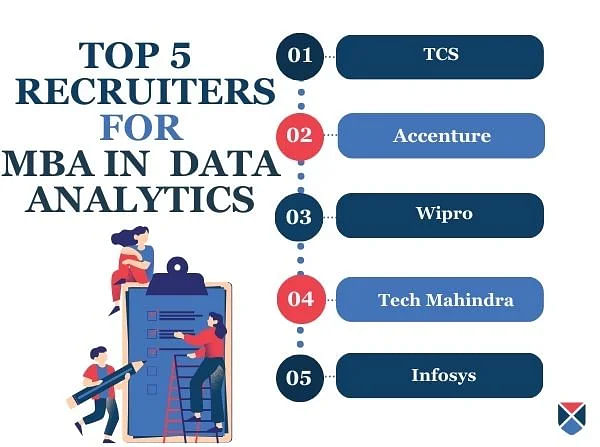
Skills Required for MBA in Data Analytics Graduate
Certain skill sets are additional help for obtaining adequate career excellence in data analytics. Learning new technologies such as big data, Hadoop, and cloud courses, is very important. Here listed are the skill sets one needs to work on to start their career as a data analyst:
- Data Visualization Skills - Data analysts can use the knowledge of data visualization to assist decision-makers in a firm. It is important to have the ability to present data findings via graphical illustrations.
- Data Cleaning Skills - Students should have an idea to know about the types of data sets and how to manage them in order to get better results.
- Knowledge of Data Analytics Tools - Understanding analytical tools such as R, Python, and Microsoft BI provides additional advantages for studying data analytics.
- Understanding of Query Languages - As students of data analytics, one must have some knowledge of SQL languages that is necessary for system management.
- Knowledge of Excel and Machine Learning - Students should be able to do simple Excel techniques which is an important step to enter the domain of analytics and they should also have sound knowledge of recent AI developments which include deep learning, neural networks, predictive analytics, etc.
- Critical Thinking - Students should be able to solve problems and make rational decisions by involving thinking critically with logical reasoning.
Top MBA in Data Analytics Colleges
Top Management Entrance Exams
MBA in Data Analytics Fee Structure
FAQs on MBA in Data Analytics
Q: Is MBA Data Analytics worth it?
Q: Who is eligible for an MBA in Data Analytics?
Q: Does data analytics require coding?
Q: Which language is used for data analytics?
Q: What is the scope of MBA Data Analytics?










